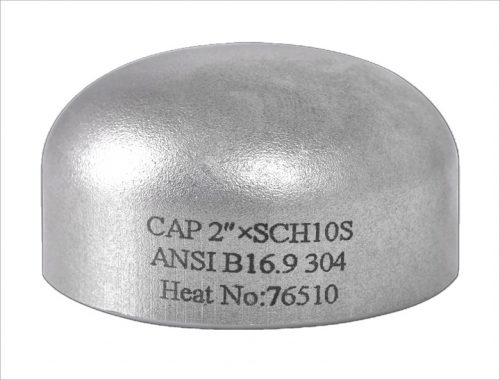Introduction:
In industrial piping systems, ensuring the safety and efficiency of the infrastructure is of paramount importance. One crucial component that plays a vital role in the integrity of these systems is the welded pipe cap. This article aims to shed light on the significance of welded pipe caps and their role in ensuring the smooth operation of industrial piping systems.
1. Definition and Purpose of Welded Pipe Caps:
A welded pipe cap, also known as an end cap, is a type of fitting that is welded onto the end of a pipe or tube. Its primary purpose is to seal the pipe, preventing the leakage of fluids, gases, or other substances. Welded pipe caps are commonly used in various industries, including oil and gas, chemical processing, water treatment, and construction.
2. Advantages of Welded Pipe Caps:
a) Leak Prevention: The welded construction of pipe caps ensures a tight seal, minimizing the risk of leakage. This is particularly crucial in industries handling hazardous materials or where fluid loss can lead to significant financial losses.
b) Protection from Contaminants: Welded pipe caps provide protection to the interior of the pipe from dust, dirt, and other contaminants. This helps maintain the quality of the transported fluid, preventing potential damage to downstream equipment or processes.
c) Structural Integrity: The secure welding of pipe caps enhances the overall structural integrity of the piping system. It helps to withstand high pressure, temperature fluctuations, and external forces, ensuring long-term reliability.
d) Easy Inspection and Maintenance: Welded pipe caps can be easily inspected and maintained, as they can be removed or replaced when necessary without affecting the entire piping system. This simplifies maintenance procedures and reduces downtime.
3. Types of Welded Pipe Caps:
a) Standard Welded Pipe Caps: These are the most commonly used pipe caps and are available in various sizes and materials. They are typically used in applications with moderate pressure and temperature requirements.
b) High-Pressure Welded Pipe Caps: Designed to withstand high-pressure environments, these caps are manufactured from robust materials such as stainless steel or alloy steel. They are commonly used in industries such as oil and gas, where pressure ratings are critical.
c) Specialized Welded Pipe Caps: Certain industries may require customized pipe caps to meet specific requirements. These specialized caps may include features such as insulation, corrosion resistance, or additional fittings for instrumentation purposes.
4. Installation and Quality Assurance:
Proper installation of welded pipe caps is crucial to ensure their effectiveness. The welding process should be carried out by certified welders, adhering to industry standards and guidelines. Quality assurance measures, such as non-destructive testing and pressure testing, should be implemented to verify the integrity of the welded joint.
Conclusion:
Welded pipe caps play a critical role in ensuring the safety, efficiency, and reliability of industrial piping systems. Their ability to provide a secure seal, protect against contaminants, and enhance structural integrity makes them indispensable in various industries. By understanding the advantages and types of welded pipe caps, industries can make informed decisions when selecting and installing these essential fittings.





